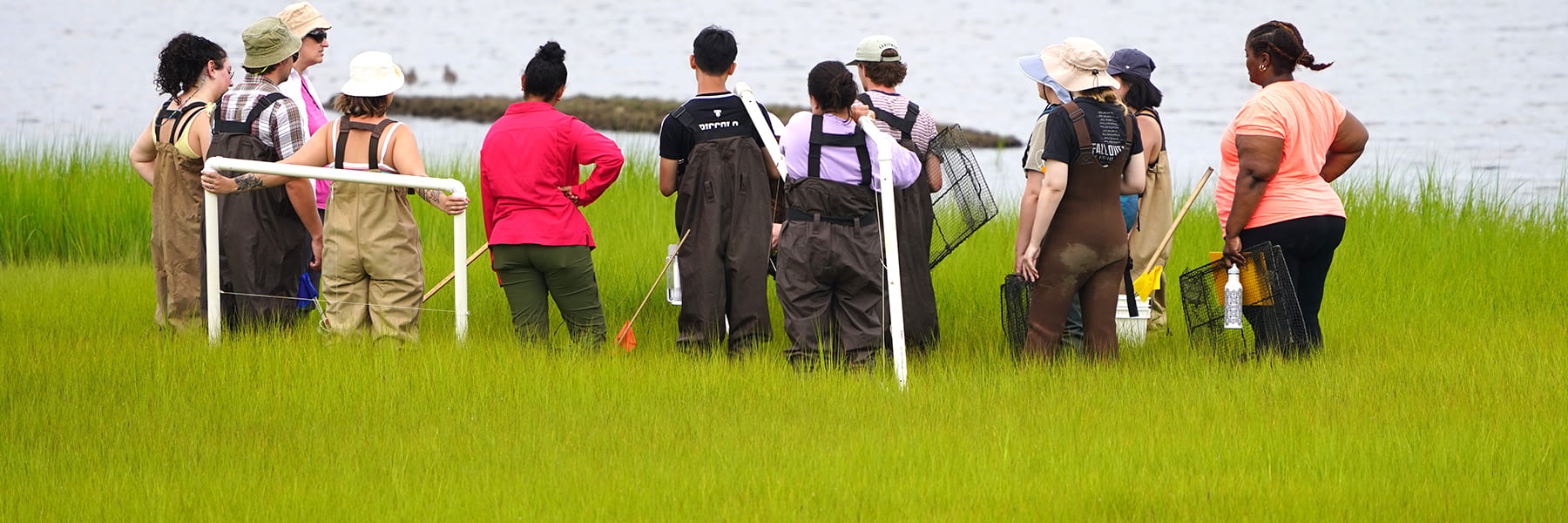- Home
- Online & Continuing Education
- Special Programs
- Courses On Nantucket
Learn More
A unique educational experience.
The Nantucket Field Station, one of the facilities of UMass Boston's School for the Environment, is a 107-acre field site of pristine salt marsh, rolling uplands, and harbor waterfront which provides education, research, and community service. We are a world-class research and educational institution and a deeply engaged member of the Nantucket community.
Each summer, UMass Boston offers several field courses from late May through August. These courses feature field work that allows participants to use the island’s natural and cultural resources to investigate classroom topics. Courses offered explore many fields of study — from marine biology to spider ecology.
ENVSCI 480 - Biodiversity of Freshwater Invertebrates
July 27 - August 9, 2025
Instructor: Helen Poynton
Class #: 1130
Fee: TBA
BIOL 344/345 - Ornithology & Lab
May 27 - June 14, 2025
Instructor: Luis De Leon Reyna
Class #: 1127/1128
Fee: TBA
Registration Closed
ENVSCI 359 - Wildlife Ecology
June 15 - 28, 2025
Instructor: Jason Courter
Class #1129
Fee: TBA
Registration Closed
Course Descriptions
BIOL 344/345 Field Ornithology (4 credits)
Ornithology is the study of birds. This course will explore the complex biology of birds, including evolution, functional morphology, physiology, ecology and behavior. Field, museum and laboratory activities emphasize particular aspects of morphology, ecology and behavior, as well as taxonomy and identification alongside native Massachusetts species.
The goal for this course is to provide a base of knowledge about birds in a way that will inspire you to keep learning about them through lecture, laboratory and field time. The course will focus primarily on the behavior, ecology and evolution of birds and the development of field skills.
BIOL 344/345 Both Lecture and Laboratory are required.
ENVSCI 359 Wildlife Ecology (3 credits)
Wildlife ecology is the scientific discipline of applying ecological principles to the study of wildlife species and their habitats which feeds into conservation and management decisions. In this course, students will be exposed to foundational wildlife ecology principles and primary literature on topics such as food and nutrition, home range and habitat use, dispersal, distribution, species interactions (e.g. population growth, competition, predation, parasites, and pathogens), behavior, and responses to environmental perturbations.
ENVSCI 480 Biodiversity of Freshwater Invertebrates (3 credits)
This course is designed to introduce students to the incredible biodiversity of freshwater invertebrates and foster an appreciation and understanding of the ecosystems we study in SFE. This course will also teach both field and molecular biomonitoring methods in freshwater environments to enhance students’ skill sets in environmental assessments.
Each day will begin with a short class to go over the field (or lab) work for the day, answer any questions and then into the field we go! Students experience immersive field sampling, lab sample processing and data analysis.
